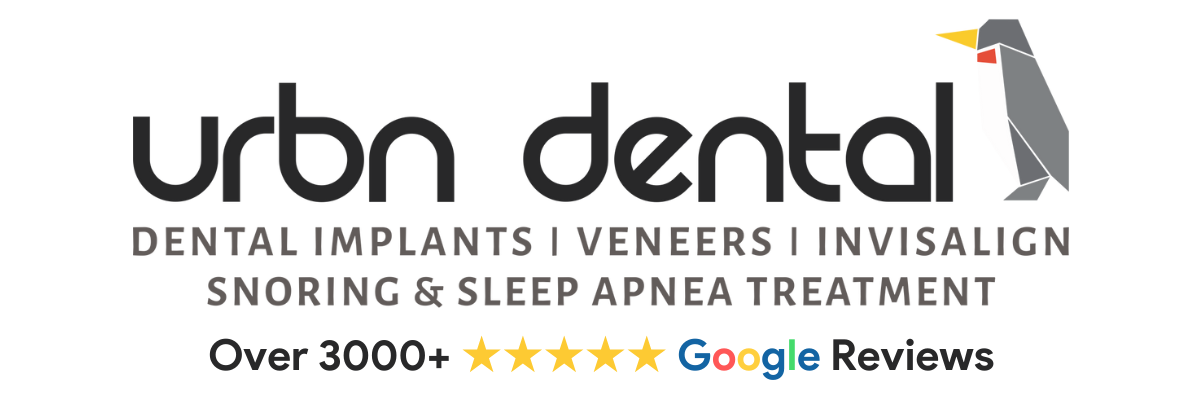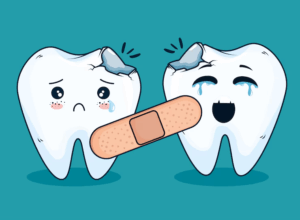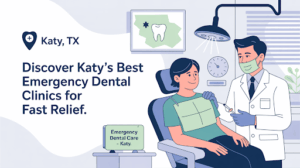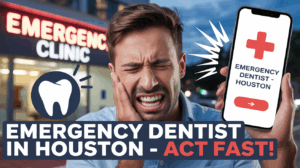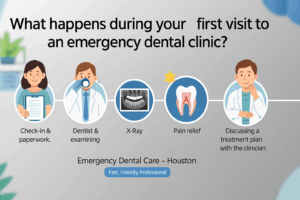If you’ve ever experienced the unsettling sensation of a cracked tooth or chipped or broken teeth, you’re not alone. Dental injuries can happen unexpectedly, and they can range from minor cosmetic issues like a cracked tooth to severe dental emergencies that necessitate a root canal, dental implant, or extraction. At URBN Dental, we understand the importance of addressing these dental concerns promptly and effectively. In this guide, we will explore common treatments for a chipped or broken tooth, ensuring you have the knowledge to make informed decisions about your oral health.
Understanding Chipped, Cracked, and Broken Teeth
Chipped Tooth
A chipped or broken tooth typically refers to a small piece of the tooth breaking off, often from the tooth’s chewing surface. This type of damage can result from accidents, injuries, or even biting down on hard objects. We can fix chipped teeth with dental bonding and other simple dental treatments.
Cracked Tooth
A cracked tooth is more severe than a chip, as it involves a crack running through the tooth, usually originating at the gum line and extending vertically. Cracked teeth can be painful and may lead to infections if left untreated. You may need a root canal if the tooth’s chewing surface breaks.
Broken Tooth
A broken tooth occurs when a significant portion of the tooth has fractured, often extending below the gum line. This can result from trauma, accidents, or advanced tooth decay. If you have a split tooth, broken tooth, or vertical root fracture, you may need a dental extraction.
Immediate Actions for Dental Emergencies
If you experience a chipped, cracked, or broken tooth, it’s essential to take immediate action to mitigate further damage and discomfort. Saving cracked teeth is possible, but you must take a few steps:
- Rinse Your Mouth: Gently rinse your mouth with warm water to remove debris and clean the area.
- Apply Cold Compress: To reduce swelling and alleviate pain, apply a cold compress to the affected area.
- Save Any Broken Pieces: If possible, save any broken tooth fragments. They may be helpful in restoring your tooth.
- Pain Management: Over-the-counter pain relievers can help manage pain until you see a dentist.
- See a Dentist: Contact URBN Dental as soon as possible to schedule an appointment. Prompt dental care is crucial in preventing further damage.
Dental Treatments for Chipped, Cracked, or Broken Teeth
Once you’ve contacted URBN Dental and scheduled an appointment, our skilled dental professionals will assess your condition and recommend the most appropriate treatment. The choice of treatment will depend on the extent of the damage and the tooth’s location. Here are some common treatments for these dental issues:
Dental Bonding
Dental bonding is an ideal solution for minor chips or cracks. It involves applying a tooth-colored composite resin to the affected area and shaping it to match the natural tooth. This procedure is quick, painless, and provides an immediate cosmetic improvement.
Dental Veneers
Dental veneers are thin shells of porcelain or composite material custom-made to fit over the front surface of your tooth. They are an excellent option for more extensive damage or for improving the appearance of discolored teeth.
Dental Fillings
For chips or minor fractures that affect the tooth’s structure, dental fillings may be recommended. These fillings can be made from various materials, including amalgam or tooth-colored composite resin.
Root Canal Therapy
If a crack extends deep into the tooth, it may expose the inner pulp, causing severe pain and the risk of infection. In such cases, a root canal may be necessary to remove the damaged pulp, clean the inside of the tooth, and seal it to prevent further infection.
Dental Crowns
For extensively damaged or broken teeth, dental crowns are often the best option. Crowns are custom-made caps that cover the entire tooth, providing strength, protection, and aesthetic restoration.
Tooth Extraction
In some instances, if the tooth is extensively damaged, decayed, or if there’s a risk of infection spreading, tooth extraction may be the only viable option. Our dental professionals will explore tooth replacement options, such as dental implants or bridges, to restore your smile.
Dental Implants
In cases where a tooth is severely damaged and cannot be saved, implants may be considered. Implants involve surgically placing a titanium post into the jawbone and attaching a prosthetic tooth. They offer a permanent and natural-looking solution for tooth loss. You may need a dental implant if you have had to undergo a tooth extraction.
Preventing Future Tooth Damage
Prevention is always better than treatment. To minimize the risk of chipped, cracked, or broken teeth, consider these preventive measures:
- Wear a Mouthguard: If you participate in contact sports or grind your teeth at night, wearing a mouthguard can protect your teeth from injury.
- Avoid Chewing on Hard Objects: Be mindful of what you chew on. Avoid biting down on ice, pens, or other hard objects that can damage your teeth.
- Maintain Good Oral Hygiene: Regular brushing, flossing, and dental check-ups can help detect and address dental issues before they become severe.
- Eat a Balanced Diet: A diet rich in calcium and other essential nutrients can strengthen your teeth and reduce the risk of decay.
Visit URBN Dental for Prompt Dental Treatment
A chipped, cracked, or broken tooth can be a distressing experience, but with the right dental care, you can restore your smile and oral health. At URBN Dental, we are dedicated to providing comprehensive and effective treatments for all your dental needs. If you find yourself facing a dental emergency or any other oral health concerns, don’t hesitate to reach out to us at any of our convenient locations in Houston, including Uptown, Midtown, Montrose, City Center, Katy, East River, and Houston Heights. We are here to help you regain your confidence and keep your smile healthy for years to come. Contact URBN Dental today, and let us be your trusted partner in achieving and maintaining optimal oral health.
